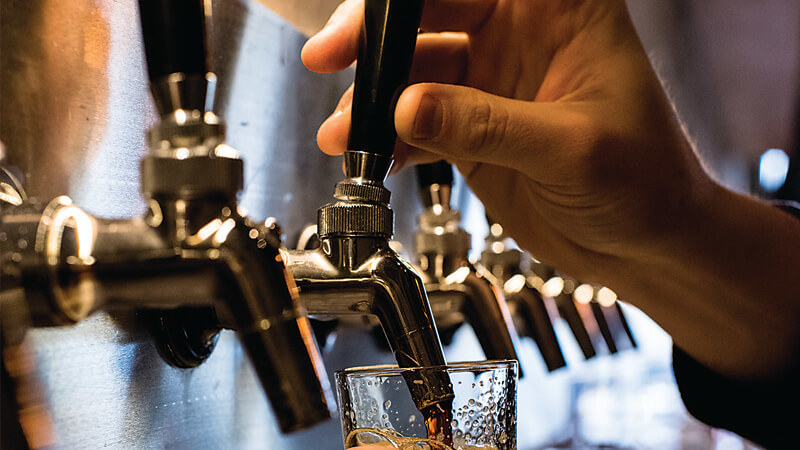
A revised bill that would secure a future for Guinness in Baltimore County passed on the Senate floor today, in a vote tallied 46-1.
“We said all along that a rising tide lifts all boats and we truly believe this legislation is a positive step forward for Maryland’s hospitality industry,” said Dwayne Kratt, senior director of government relations for Diageo, Guinness’ parent company, in a statement. “We look forward to delivering on our promise to be a supportive member of Maryland’s brewer community.”
If approved, the compromise legislation would raise the cap on production to 3,000 barrels per year, permit the practice of contract brewing (25 percent of a taproom’s beer would be able to be produced offsite), and allow existing breweries to maintain their normal hours. New breweries, however, would need to close by 10 p.m.
“[The revised legislation] is good for us,” says Mike McDonald, co-owner of Key Brewing Company in Dundalk. “But I would like to see everybody have the same opportunities in the future.”
The legislation, HB 1283, has been a hot-button issue in the local beer industry ever since it passed unanimously in the House of Delegates last month. The bill—which was drafted in the wake of Guinness’ decision to build a large-scale brewery in Relay—moved to raise the cap on production for all Maryland breweries to 3,000 barrels per year, but with the caveat of limiting contract brewing and curtailing taproom hours in order to reduce competition among breweries and neighboring bars and retailers.
In its original form, the bill was met with fierce opposition from Diageo as well as the Brewers Association of Maryland (BAM)—who argued during a meeting in the Senate’s Education, Health, and Environmental Affairs committee last week that the bill would be “one step forward and two steps backward.” The meeting also included representatives from the Maryland State Beverage License Association, Maryland Beer Wholesalers Association, and United Food and Commercial Workers Union.
Taking into consideration the amendments proposed by the many different players invested in the issue, the Senate crafted a revised version of the bill that was voted favorably in committee this morning, and passed on the full Senate floor this afternoon. The only dissenting vote came from Senator Ron Young, who has long been a proponent of the craft beer industry. Now, the bill moves on to the House of Delegates for approval before the 90-day legislative session ends at midnight on Monday, April 10.
“We believe, as we enter the last days of the 2017 legislative session, that HB 1283 as approved by the Senate, is the best compromise that could be achieved to protect local brewers this year,” said BAM’s executive director Kevin Atticks, in a statement.
BAM members say that the intention is to revisit the stipulation restricting taproom hours for new facilities during the next General Assembly session.
“Despite these improvements, BAM believes there is much more to be done to transform Maryland law to support local craft brewers,” Atticks said. “We accept this bill as passed by the Senate as a step toward making Maryland friendlier to our industry with the understanding that BAM will continue to support existing, new and prospective Maryland brewers.”
Baltimore Beer Babes co-founder Judy Neff plans to debut Checkerspot Brewing in South Baltimore this September. Though Checkerspot is technically considered an existing brewery (management submitted its requisite TTB forms before the December cut-off date), Neff says that she understands how the taproom restrictions could potentially hinder brewers from settling throughout the state.
“If we weren’t being grandfathered in, and were being treated differently, then that very well may have affected our ability to open,” Neff says. “But it’s a small and growing scene, it’ll come back around eventually.”
Neff says that, rather than being discouraged by the controversy, she remains inspired by the manner in which local brewers have unified to promote the evolution of the industry.
“Everyone has been very proactive,” she says. “They’re not just sitting back and saying, ‘Someone else will take care of this.’ There are so many people who took valuable time to talk with delegates and senators, and to testify in Annapolis. It really speaks the craft brewing industry as a whole.”
McDonald echoes that sentiment: “It was nice to see people felt that strongly and got together on this quickly,” he says. “Everything unfolded at a rapid pace, but it feels good to be in such a collaborative industry.”
